Your Cellular respiration meaning in biology images are available in this site. Cellular respiration meaning in biology are a topic that is being searched for and liked by netizens now. You can Get the Cellular respiration meaning in biology files here. Find and Download all free vectors.
If you’re searching for cellular respiration meaning in biology pictures information related to the cellular respiration meaning in biology keyword, you have pay a visit to the right blog. Our site always provides you with suggestions for downloading the highest quality video and picture content, please kindly surf and locate more enlightening video articles and graphics that fit your interests.
Cellular Respiration Meaning In Biology. From prokaryotic bacteria and archaeans to eukaryotic protists fungi plants and animals all living organisms undergo respiration. Like all living things plants go through cellular respiration to obtain energy for growth and reproduction. Cellular Respiration Definition Cellular respiration is the process through which cells convert sugars into energy. Aerobic respiration requires oxygen to fully oxidise the organic molecule.
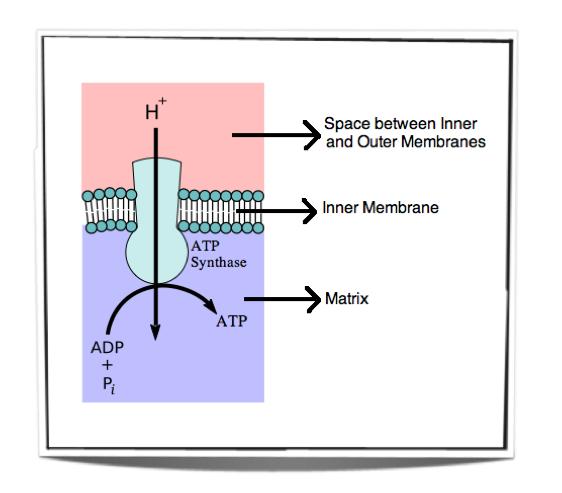 Ib Biology Notes 8 1 Cell Respiration From ibguides.com
Ib Biology Notes 8 1 Cell Respiration From ibguides.com
Cellular respiration refers to both aerobic and anaerobic respiration but is often synonymous with aerobic respiration. The first step of cellular respiration glycolysis takes place in the cytoplasm as the enzymes required for glycolysis are present in the cytoplasm. Biology Definition of Cellular Respiration You will find numerous respiration processes in living items and respirations definition could be how an organism employs oxygen to produce power The process of respiration is the single most important region of the cells metabolic rate. Respiration is the process in which organisms exchange gases between their body cells and the environment. Within the eukaryotic cell the process begins in the cytoplasm. Cellular respiration is the set of the metabolic reactions and processes that take place in the cells of organisms to convert biochemical energy from nutrients into adenosine triphosphate ATP and then release waste products.
Respiration is one of the.
The process plays an essential role in maintaining the biological functions of all living cells. Cellular respiration as the name suggests takes place in individual cells to produce energy for the particular cell. The respiration can be aerobic which uses glucose and oxygen or anaerobic which uses only. Within the eukaryotic cell the process begins in the cytoplasm. Respiration is one of the. Aerobic respiration requires oxygen to fully oxidise the organic molecule.
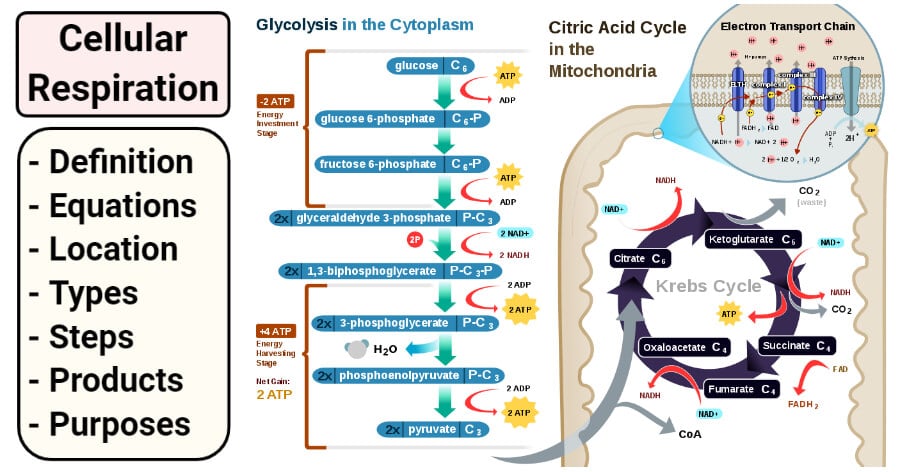 Source: microbenotes.com
Source: microbenotes.com
The respiration can be aerobic which uses glucose and oxygen or anaerobic which uses only. The process plays an essential role in maintaining the biological functions of all living cells. The first step of cellular respiration glycolysis takes place in the cytoplasm as the enzymes required for glycolysis are present in the cytoplasm. Cellular respiration is the process of using the chemical energy stored in sugars. Cellular Respiration Definition Cellular respiration is the process through which cells convert sugars into energy.
 Source: ibguides.com
Source: ibguides.com
Cellular respiration refers to both aerobic and anaerobic respiration but is often synonymous with aerobic respiration. Respiration is the biochemical process in which the cells of an organism obtain energy by combining oxygen and glucose resulting in the release of carbon dioxide water and ATP the currency of. Cellular Respiration Definition Cellular respiration is the process through which cells convert sugars into energy. Both aerobic and anaerobic respiration involve chemical reactions which take place in the cell to produce energy which is needed for active processes. The reactions involved in respiration are catabolic reactions which break large molecules into smaller ones releasing energy because weak high-energy bonds in particular in molecular oxygen are replaced by stronger bonds in the products.
 Source: pinterest.com
Source: pinterest.com
Respiration is one of the. Cellular respiration is the process of using the chemical energy stored in sugars. The first step of cellular respiration glycolysis takes place in the cytoplasm as the enzymes required for glycolysis are present in the cytoplasm. Glucose oxygen yields carbon dioxide water. From prokaryotic bacteria and archaeans to eukaryotic protists fungi plants and animals all living organisms undergo respiration.
 Source: m.youtube.com
Source: m.youtube.com
In this process glucose is broken down in the presence of molecular oxygen into six molecules of carbon dioxide and much of the energy released is preserved by turning adp and free phosphate into atp. Cellular respiration is the process by which organisms use oxygen to break down food molecules to get chemical energy for cell functions. From prokaryotic bacteria and archaeans to eukaryotic protists fungi plants and animals all living organisms undergo respiration. Cellular respiration refers to both aerobic and anaerobic respiration but is often synonymous with aerobic respiration. Within the eukaryotic cell the process begins in the cytoplasm.
 Source: study.com
Source: study.com
Cellular respiration is a set of metabolic reactions and processes that take place in the cells of organisms to convert chemical energy from oxygen molecules or nutrients into adenosine triphosphate and then release waste products. Cellular respiration All organisms respire in order to release energy to fuel their living processes. Both aerobic and anaerobic respiration involve chemical reactions which take place in the cell to produce energy which is needed for active processes. The reaction is the mirror image of photosynthesis. Cellular respiration is a set of metabolic reactions and processes that take place in the cells of organisms to convert chemical energy from oxygen molecules or nutrients into adenosine triphosphate and then release waste products.
 Source: pinterest.com
Source: pinterest.com
Cellular Respiration Definition Cellular respiration is the process through which cells convert sugars into energy. The process plays an essential role in maintaining the biological functions of all living cells. Cellular respiration is the set of the metabolic reactions and processes that take place in the cells of organisms to convert biochemical energy from nutrients into adenosine triphosphate ATP and then release waste products. Both aerobic and anaerobic respiration involve chemical reactions which take place in the cell to produce energy which is needed for active processes. Cellular respiration as the name suggests takes place in individual cells to produce energy for the particular cell.
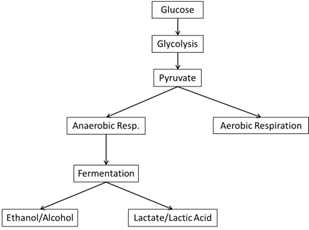 Source: wyzant.com
Source: wyzant.com
Cellular respiration begins by breaking down sugars known as glucose during a process called glycolysis. Cellular respiration is the process of using the chemical energy stored in sugars. The reaction is the mirror image of photosynthesis. Respiration may refer to any of the three elements of the process. Respiration is the process in which organisms exchange gases between their body cells and the environment.
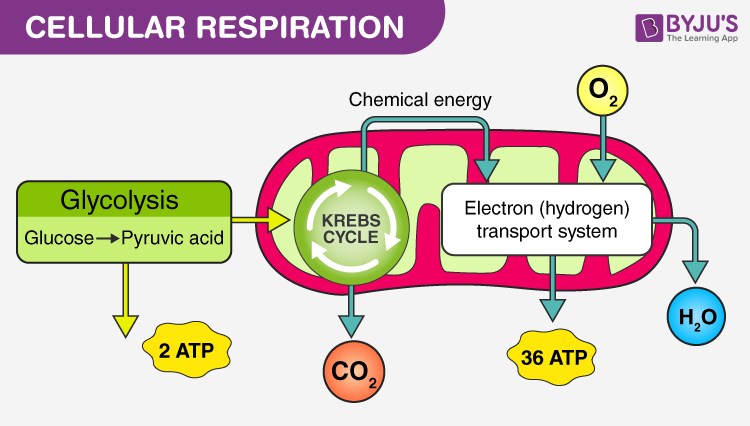 Source: byjus.com
Source: byjus.com
The process plays an essential role in maintaining the biological functions of all living cells. Cellular respiration is a set of metabolic reactions and processes that take place in the cells of organisms to convert chemical energy from oxygen molecules or nutrients into adenosine triphosphate and then release waste products. The reactions involved in respiration are catabolic reactions which break large molecules into smaller ones releasing energy because weak high-energy bonds in particular in molecular oxygen are replaced by stronger bonds in the products. The process plays an essential role in maintaining the biological functions of all living cells. Cellular Respiration Definition Cellular respiration is the process through which cells convert sugars into energy.
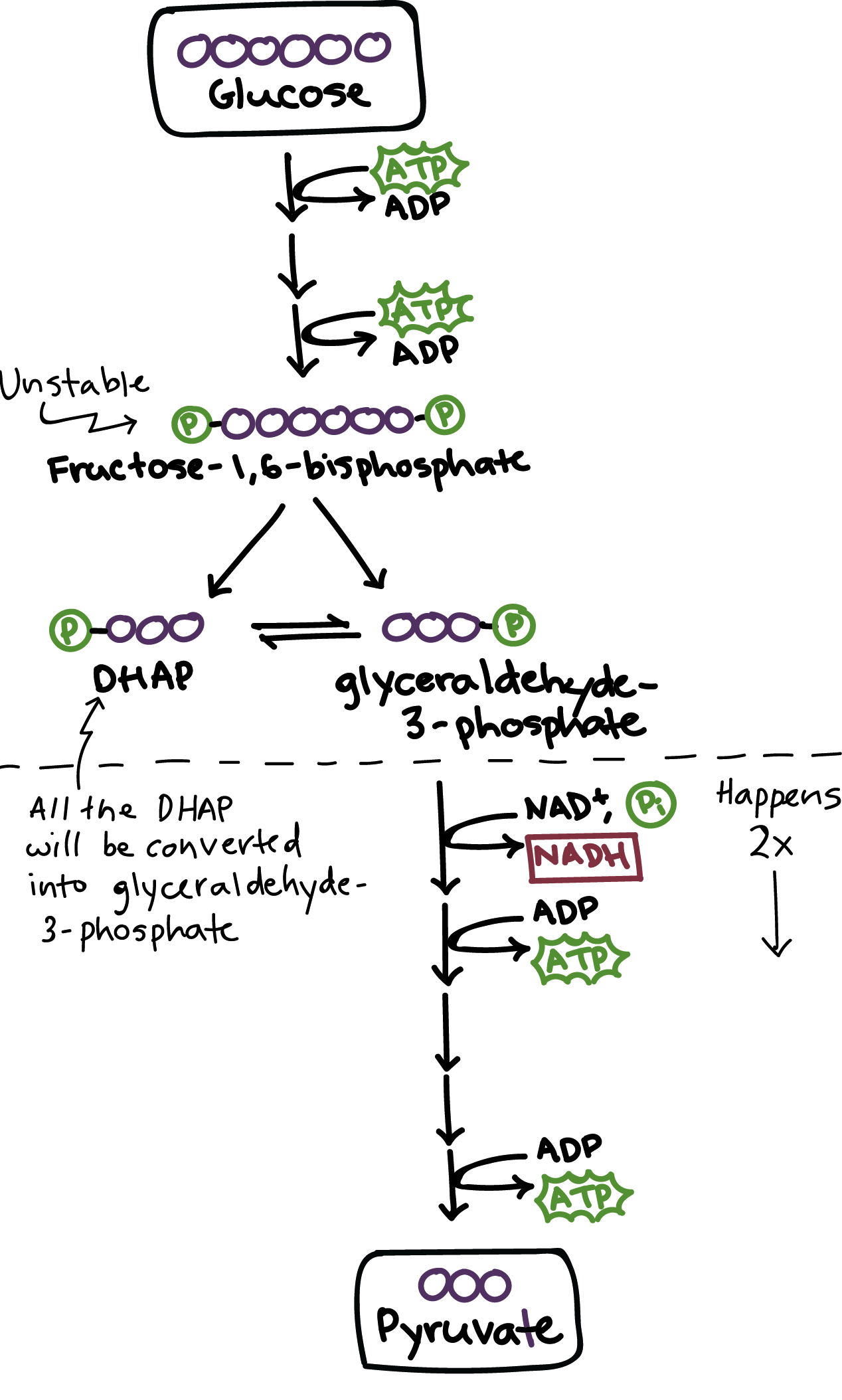 Source: khanacademy.org
Source: khanacademy.org
Both aerobic and anaerobic respiration involve chemical reactions which take place in the cell to produce energy which is needed for active processes. Like all living things plants go through cellular respiration to obtain energy for growth and reproduction. Cellular respiration is a biological process in which cells convert sugar amino acids and fatty acids into energy utilized by the cell. Cellular respiration All organisms respire in order to release energy to fuel their living processes. Within the eukaryotic cell the process begins in the cytoplasm.
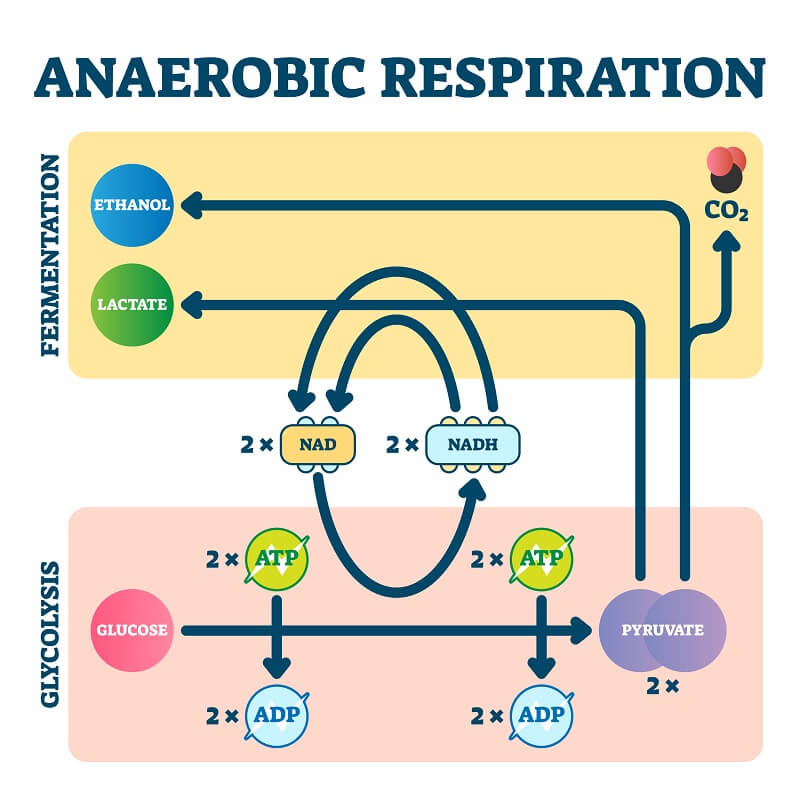 Source: biologydictionary.net
Source: biologydictionary.net
In this process glucose is broken down in the presence of molecular oxygen into six molecules of carbon dioxide and much of the energy released is preserved by turning adp and free phosphate into atp. Aerobic respiration requires oxygen to fully oxidise the organic molecule. In this process glucose is broken down in the presence of molecular oxygen into six molecules of carbon dioxide and much of the energy released is preserved by turning adp and free phosphate into atp. Cellular respiration is a biological process in which cells convert sugar amino acids and fatty acids into energy utilized by the cell. Like all living things plants go through cellular respiration to obtain energy for growth and reproduction.
 Source: astarbiology.com
Source: astarbiology.com
To create ATP and other forms of energy to power cellular reactions cells require fuel and an electron acceptor which drives the chemical process of turning energy into a useable form. Cellular Respiration Definition Cellular respiration is the process through which cells convert sugars into energy. Cellular respirationis the set of metabolic reactions and processes that take place in the cells of organisms to convert biochemical energy from nutrientsinto adenosine triphosphateATP and then release waste products. Respiration is the biochemical process in which the cells of an organism obtain energy by combining oxygen and glucose resulting in the release of carbon dioxide water and ATP the currency of. The respiration can be aerobic which uses glucose and oxygen or anaerobic which uses only.
 Source: www2.yvcc.edu
Source: www2.yvcc.edu
The reactions involved in respiration are catabolic reactions which break large molecules into smaller ones releasing energy because weak high-energy bonds in particular in molecular oxygen are replaced by stronger bonds in the products. Cellular respiration is a biological process in which cells convert sugar amino acids and fatty acids into energy utilized by the cell. Glucose oxygen yields carbon dioxide water. Animalsmetabolize food through a process known as cellular respiration. Cellular respiration is the set of the metabolic reactions and processes that take place in the cells of organisms to convert biochemical energy from nutrients into adenosine triphosphate ATP and then release waste products.
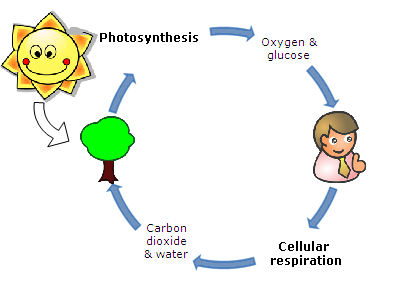 Source: study.com
Source: study.com
The reaction is the mirror image of photosynthesis. Cellular respiration is the set of the metabolic reactions and processes that take place in the cells of organisms to convert biochemical energy from nutrients into adenosine triphosphate ATP and then release waste products. To create ATP and other forms of energy to power cellular reactions cells require fuel and an electron acceptor which drives the chemical process of turning energy into a useable form. Cellular respiration is the process of using the chemical energy stored in sugars. Animalsmetabolize food through a process known as cellular respiration.
 Source: slideplayer.com
Source: slideplayer.com
Cellular respiration is a biological process in which cells convert sugar amino acids and fatty acids into energy utilized by the cell. Cellular respiration begins by breaking down sugars known as glucose during a process called glycolysis. Both aerobic and anaerobic respiration involve chemical reactions which take place in the cell to produce energy which is needed for active processes. Animalsmetabolize food through a process known as cellular respiration. Cellular respiration refers to both aerobic and anaerobic respiration but is often synonymous with aerobic respiration.
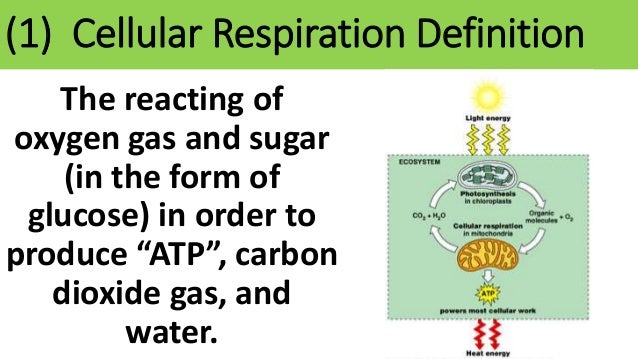 Source: slideshare.net
Source: slideshare.net
Cellular respiration is the process of using the chemical energy stored in sugars. Respiration may refer to any of the three elements of the process. Cellular respiration refers to both aerobic and anaerobic respiration but is often synonymous with aerobic respiration. Respiration is one of the. In this process glucose is broken down in the presence of molecular oxygen into six molecules of carbon dioxide and much of the energy released is preserved by turning adp and free phosphate into atp.
 Source: khanacademy.org
Source: khanacademy.org
The process plays an essential role in maintaining the biological functions of all living cells. Like all living things plants go through cellular respiration to obtain energy for growth and reproduction. The first step of cellular respiration glycolysis takes place in the cytoplasm as the enzymes required for glycolysis are present in the cytoplasm. Glucose oxygen yields carbon dioxide water. Cellular respiration refers to both aerobic and anaerobic respiration but is often synonymous with aerobic respiration.
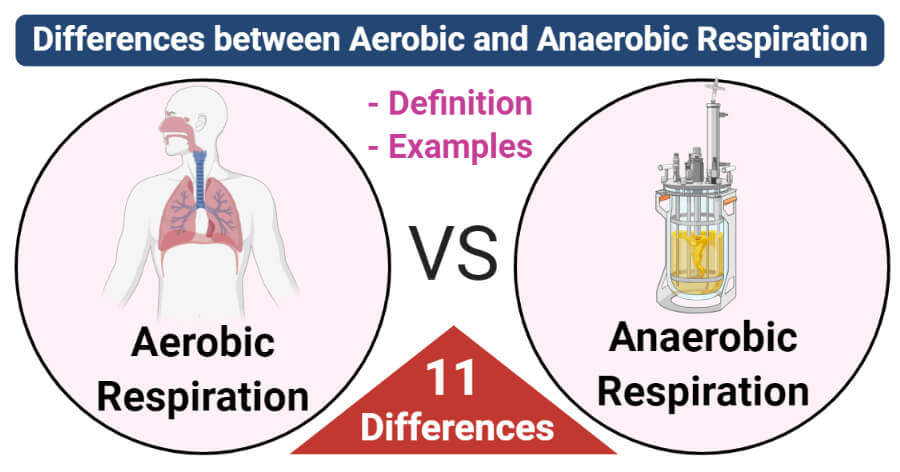 Source: microbenotes.com
Source: microbenotes.com
Cellular respiration is the process by which organisms use oxygen to break down food molecules to get chemical energy for cell functions. Cellular respirationis the set of metabolic reactions and processes that take place in the cells of organisms to convert biochemical energy from nutrientsinto adenosine triphosphateATP and then release waste products. Within the eukaryotic cell the process begins in the cytoplasm. The first step of cellular respiration glycolysis takes place in the cytoplasm as the enzymes required for glycolysis are present in the cytoplasm. Respiration is one of the.
 Source: ib.bioninja.com.au
Source: ib.bioninja.com.au
From prokaryotic bacteria and archaeans to eukaryotic protists fungi plants and animals all living organisms undergo respiration. The process plays an essential role in maintaining the biological functions of all living cells. From prokaryotic bacteria and archaeans to eukaryotic protists fungi plants and animals all living organisms undergo respiration. Respiration may refer to any of the three elements of the process. Biology Definition of Cellular Respiration You will find numerous respiration processes in living items and respirations definition could be how an organism employs oxygen to produce power The process of respiration is the single most important region of the cells metabolic rate.
This site is an open community for users to do submittion their favorite wallpapers on the internet, all images or pictures in this website are for personal wallpaper use only, it is stricly prohibited to use this wallpaper for commercial purposes, if you are the author and find this image is shared without your permission, please kindly raise a DMCA report to Us.
If you find this site value, please support us by sharing this posts to your preference social media accounts like Facebook, Instagram and so on or you can also bookmark this blog page with the title cellular respiration meaning in biology by using Ctrl + D for devices a laptop with a Windows operating system or Command + D for laptops with an Apple operating system. If you use a smartphone, you can also use the drawer menu of the browser you are using. Whether it’s a Windows, Mac, iOS or Android operating system, you will still be able to bookmark this website.





